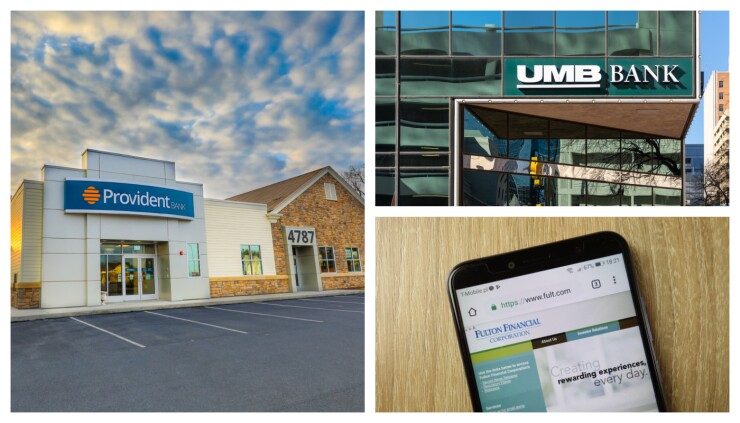
In recent years, the typical bank acquisition has been fairly straightforward: Bank A buys Bank B, generally in an all-stock transaction or with some combination of cash and stock.
But recently that pattern has started to change. In late March,
UMB Financial and Fulton Financial each conducted capital raises around the time that they announced their respective acquisitions last month. UMB, which is based in Kansas City, Missouri, raised a net $201.6 million. Fulton, in Lancaster, Pennsylvania, generated a net $273.5 million.
The additional capital should bolster key regulatory ratios at a time when there are industrywide concerns about potential credit deterioration and lingering uncertainty around the impact that higher-for-longer interest rates will have on the value of banks' securities portfolios.
Other banks that are preparing for their own M&A transactions may opt to follow suit, according to Mary Eyre, the managing director of the M&A advisory practice for the consulting firm Cornerstone Advisors.
"They're setting a precedent," Eyre said about the banks that have conducted capital raises. "Other banks are seeing that and saying, 'They're doing that successfully. Why shouldn't we?'"
But activity has begun to ramp up this spring. In April, 12 deals were announced, Hunsicker wrote in a research note. The list includes
The fact that capital raises are popping up in connection with M&A deals is noteworthy, in part because of what the cash is not being used for, some bank analysts and consultants said.
"They're not raising cash because they need it for the transaction," Eyre said. "They're doing it for other reasons."
Fulton has said that its capital raise did not come in response to a regulatory requirement, and it doesn't appear that UMB's hand was forced by its regulators, either. Both banks say they plan to use the net proceeds generated from their offerings for "general corporate purposes."
At UMB, that could include "contributing Tier 1 capital" into its banking subsidiary, UMB Bank, the company said in an April 29 press release announcing its capital raise.
On Thursday, UMB CEO Mariner Kemper said the capital raise provides the $45.3 billion-asset company with "ample dry powder and capital to fully support" its pending Heartland acquisition.
Because UMB's capital ratios will decline when the deal closes, "the offensive capital raise further bolsters such ratios and provides downside protection should the fair value of acquired assets decline due to interest rate movements," Kemper said in an email.
UMB's move makes sense, according to Jared Shaw, an analyst at Barclays. The sale of 2.8 million shares of common stock kept the company's common equity Tier 1 ratio above 10%.
"In general, it feels like 10% is a little bit of a hard floor for regulatory capital ratios right now while we're still in the aftermath" of last year's banking crisis, Shaw said in an interview. "And holding onto extra capital is another way for banks to build a stronger balance sheet and liquidity."
At Fulton, selling common stock will support "continued growth" across the bank's entire footprint, a Fulton spokesperson said Thursday in an email. The $27.6 billion-asset company "elected to raise supplementary capital to further bolster" its balance sheet and capitalization, the spokesperson said.
Otherwise, Fulton's capital ratios would have dipped post-acquisition and stymied its ability to grow, said Frank Schiraldi, a Piper Sandler analyst who covers the bank.
So even if a capital raise is not a regulatory requirement, "it's a reasonable thing to do because you want to be well positioned for growth opportunities and it makes sense as long as there is demand from investors," Schiraldi said. "I think that's the big takeaway: There's been good demand from investors."
The third bank to raise capital recently in connection with an M&A deal, Provident Financial Services in Iselin, New Jersey, generated $219.3 million in net proceeds from its capital raise. The offering was required by the bank's regulators in order for Provident to get approval to buy Lakeland Bancorp in Oak Ridge, New Jersey.
Provident, whose assets increased to $24.5 billion of assets when the deal was finalized this week, must also maintain a Tier 1 capital-to-total-assets leverage ratio of at least 8.5% and limit its commercial real estate loan portfolio to a certain size, according to the requirements that its regulators imposed.
The company has been clear that it is raising capital in response to regulatory demands.
What's less clear is whether other banks are being encouraged by regulators to boost their own capital levels, or if they feel they need to do so in order to improve the chances that their deals will get approved, said Terry McEvoy, an analyst at Stephens Research.
"How much of this is behind the scenes? That's a difficult question to answer," McEvoy said.






